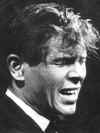|
|
|

Born in Oregon U.S.A. on the 10th January 1927, Johnnie Ray moved at a very young age to Hollywood. He overcame tremendous hearing problems which stemmed from an accident whilst he was at a Boy Scout Jamboree at the age of 13. Although wearing a hearing aid when performing on stage, it was something that he found not only uncomfortable but also difficult to come to terms with, as the gadgets in those days weren't really music friendly. As he later himself admitted, the hearing aid itself affected not only his speech on stage, but it also distracted his audience.
In 1957 Johnnie signed for Okeh Records, a parent company of Columbia Records. The label itself was aimed at the black music market and by many people the voice of Johnnie Ray was thought to have belonged to a black blues singer. However, when it came to light that this singer was actually a good looking 27-year-old white singer it caused a lot of raised eyebrows.
Early releases from Johnnie Ray included "Tell The Lady I Said Goodbye", "Whiskey & Gin" and what must have been his most popular song, "Cry". Although "Cry" has been recorded by several other artists - from Ray Charles to Crystal Gayle - nobody has matched the 35.000 copies or the 11 weeks at the top of the charts that Johnnie Ray enjoyed. The song itself was actually written by Churchill Kohlmann and a night watchman in a dry cleaning factory. Rumour has it that they weren't actually happy with the new version, because they wanted it sung in a country style.
 As
the title "Cry" suggests, it was a very emotional song and Ray's stage
manner followed suit. He was probably the first singer to express feelings
on stage and these emotions penetrated through to the audience. Instead
of just standing behind the microphone he used to move around the stage
with it in his hand and made suggestive gestures to his adoring fans. At
first this behaviour came as a shock to a lot of people, especially to
mothers and fathers. For parents he became a nightmare as teenagers flocked
to the stage and screamed at his concerts. These scenes can only be compared
to groups which appeared much later, such as The Beatles.
As
the title "Cry" suggests, it was a very emotional song and Ray's stage
manner followed suit. He was probably the first singer to express feelings
on stage and these emotions penetrated through to the audience. Instead
of just standing behind the microphone he used to move around the stage
with it in his hand and made suggestive gestures to his adoring fans. At
first this behaviour came as a shock to a lot of people, especially to
mothers and fathers. For parents he became a nightmare as teenagers flocked
to the stage and screamed at his concerts. These scenes can only be compared
to groups which appeared much later, such as The Beatles.
After signing for Columbia Records he enjoyed further hits with "Here Am I - Broken Hearted", "Somebody Stole My Gal" and "Walking My Baby Back Home". In 1954 he turned his attention to acting when he played the part of a priest in Irving Berlin's musical "If You Believe".
Unfortunately in the late 50s rumours spread about his drug taking and homosexuality and he became more popular abroad than in America. In the U.K. in particular he became a real star with records such as "Hey There", "Just Walking In The Rain", "Yes", "Ma Says Pa Says", "Full Time Job", "Let's Walk That Way" with Doris Day and "Good Evening Friends" with Frankie Laine.
Probably because of the changes in pop music he turned to cabaret in the 60s but, faced with both bankruptcy and alcoholism, he found life difficult. However, switching yet again back to music in the 70s and 80s, he found renewed success and, using his old material, he headlined in the U.K. right up until he died of liver cancer on 24th February 1990.
Several writers have described Johnnie Ray's style, but one quote I consider quite apt is the one that says he was the link between Frank Sinatra and Elvis Presley.